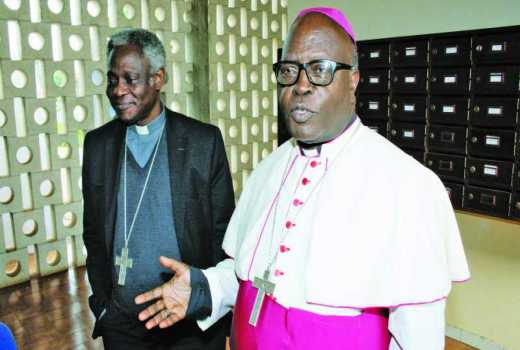
The Catholic Church has renewed the war against contraceptives at a time Kenya has won a global award for accelerated use of birth control products.
Kisumu Catholic Archbishop Zacchaeus Okoth said distribution of free contraceptives and abortions had resulted in a population decline in the past five years in the region.
Interestingly, the Ministry of Health report shows areas around Kisumu Catholic Archdiocese have achieved highest use of contraceptives in the country.
Kisumu, Bungoma, Siaya, Vihiga, Busia, Kericho and Kakamega, Kisii, all under the Archdiocese have more than 56 per cent of married women using contraceptives.
This has been attributed to an aggressive five-year project funded and overseen by American organisations.
The initiative: ‘Reversing the Stall in Fertility Decline in Western Kenya Project,’ implemented in Busia and Siaya, ends in January but there are plans to expand the same.
This comes at a time the Ministry of Health has received the global Excellence in Leadership for Family Planning Award.
The award cited Kenya for meeting and even surpassing its commitments to FP2020 – a United Nations driven initiative involving 69 donor dependent countries.
While Kenya had committed to have 52 per cent of married women on modern contraceptives by 2015, she had attained 53 per cent coverage by 2014.
A contraceptive use update by the Ministry of Health shows the country is likely to achieve its 2020 target of 58 per cent contraceptive coverage this year.
Assessment
A final report published in October shows the project managed to increase supply and demand for contraceptives and reducing family size.
The project reports reaching 615,826 people at home and public meeting with family planning messages through 600 community workers.
“During these two outreach activities alone, 78,887 contraceptive pills, 2240 intrauterine contraceptive devices and 19,745 implants were offered,” says the report.
The report also shows the project to have reduced the family size in the two counties by at least one child.
Between 2009- 2014, the report says contraceptive use had risen to 51 per cent in Siaya from 33 per cent and 57 per cent in Busia from 41 per cent.
During the same period, the number of children per woman had dropped from 5.4 to 4.2 in Siaya, and from 5.6 to 4.7 in Busia.
Between 2013 and 2015, an assessment report by the American consultants, Mathematica Policy Research shows the project to have distributed about 4.2 million free condoms in Busia and Siaya.
The project also known as the Packard Western Kenya is largely funded by David and Lucile Packard Foundation. David Packard who died in 1996 was the co-founder of the American IT giant Hewlett-Packard or HP.
The project is coordinated by the Nairobi based African Population Health Research Centre which has its mother company by the same name registered in the US.
Other majors in the project are Marie Stopes Kenya and Family Health Options Kenya both experts in abortion care and funded by the US and UK governments through thirds party arrangements.
The project targeted women aged 15-49 and men aged 15-59 but also school children. Bishop Okoth says it was unfortunate that even schoolgirls have been put on contraceptive pills.
However the project report says they are only offering reproduction health education to school children and sensitizing them on their sexual rights.
But project strategies to reach the youngest, the Mathematica report shows had their own way of getting to adolescents.
Project workers, the report says would organise meeting for youth privately outside their homes and use code words to communicate with this age group.
Despite the new opposition from the Catholic Church the project had deliberately catered for religious sentiments and participation in all its activities.
The planners, the report show had pulled in the Christian Health Association of Kenya a grouping of protestant churches in the country.
While in the past the protestant churches have opposed the distribution of contraceptives to school children unlike the Catholics it is not opposed to modern family planning methods.
www.rocketscience.co.ke
 The Standard Group Plc is a multi-media organization with investments in media
platforms spanning newspaper print
operations, television, radio broadcasting, digital and online services. The
Standard Group is recognized as a
leading multi-media house in Kenya with a key influence in matters of national
and international interest.
The Standard Group Plc is a multi-media organization with investments in media
platforms spanning newspaper print
operations, television, radio broadcasting, digital and online services. The
Standard Group is recognized as a
leading multi-media house in Kenya with a key influence in matters of national
and international interest.











